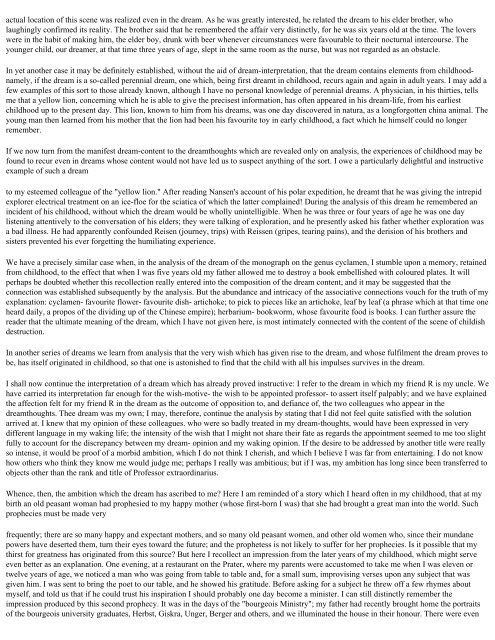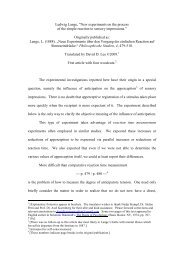The Interpretation Of Dreams Sigmund Freud (1900) PREFACE
The Interpretation Of Dreams Sigmund Freud (1900) PREFACE
The Interpretation Of Dreams Sigmund Freud (1900) PREFACE
You also want an ePaper? Increase the reach of your titles
YUMPU automatically turns print PDFs into web optimized ePapers that Google loves.
actual location of this scene was realized even in the dream. As he was greatly interested, he related the dream to his elder brother, who<br />
laughingly confirmed its reality. <strong>The</strong> brother said that he remembered the affair very distinctly, for he was six years old at the time. <strong>The</strong> lovers<br />
were in the habit of making him, the elder boy, drunk with beer whenever circumstances were favourable to their nocturnal intercourse. <strong>The</strong><br />
younger child, our dreamer, at that time three years of age, slept in the same room as the nurse, but was not regarded as an obstacle.<br />
In yet another case it may be definitely established, without the aid of dream-interpretation, that the dream contains elements from childhood-<br />
namely, if the dream is a so-called perennial dream, one which, being first dreamt in childhood, recurs again and again in adult years. I may add a<br />
few examples of this sort to those already known, although I have no personal knowledge of perennial dreams. A physician, in his thirties, tells<br />
me that a yellow lion, concerning which he is able to give the precisest information, has often appeared in his dream-life, from his earliest<br />
childhood up to the present day. This lion, known to him from his dreams, was one day discovered in natura, as a longforgotten china animal. <strong>The</strong><br />
young man then learned from his mother that the lion had been his favourite toy in early childhood, a fact which he himself could no longer<br />
remember.<br />
If we now turn from the manifest dream-content to the dreamthoughts which are revealed only on analysis, the experiences of childhood may be<br />
found to recur even in dreams whose content would not have led us to suspect anything of the sort. I owe a particularly delightful and instructive<br />
example of such a dream<br />
to my esteemed colleague of the "yellow lion." After reading Nansen's account of his polar expedition, he dreamt that he was giving the intrepid<br />
explorer electrical treatment on an ice-floe for the sciatica of which the latter complained! During the analysis of this dream he remembered an<br />
incident of his childhood, without which the dream would be wholly unintelligible. When he was three or four years of age he was one day<br />
listening attentively to the conversation of his elders; they were talking of exploration, and he presently asked his father whether exploration was<br />
a bad illness. He had apparently confounded Reisen (journey, trips) with Reissen (gripes, tearing pains), and the derision of his brothers and<br />
sisters prevented his ever forgetting the humiliating experience.<br />
We have a precisely similar case when, in the analysis of the dream of the monograph on the genus cyclamen, I stumble upon a memory, retained<br />
from childhood, to the effect that when I was five years old my father allowed me to destroy a book embellished with coloured plates. It will<br />
perhaps be doubted whether this recollection really entered into the composition of the dream content, and it may be suggested that the<br />
connection was established subsequently by the analysis. But the abundance and intricacy of the associative connections vouch for the truth of my<br />
explanation: cyclamen- favourite flower- favourite dish- artichoke; to pick to pieces like an artichoke, leaf by leaf (a phrase which at that time one<br />
heard daily, a propos of the dividing up of the Chinese empire); herbarium- bookworm, whose favourite food is books. I can further assure the<br />
reader that the ultimate meaning of the dream, which I have not given here, is most intimately connected with the content of the scene of childish<br />
destruction.<br />
In another series of dreams we learn from analysis that the very wish which has given rise to the dream, and whose fulfilment the dream proves to<br />
be, has itself originated in childhood, so that one is astonished to find that the child with all his impulses survives in the dream.<br />
I shall now continue the interpretation of a dream which has already proved instructive: I refer to the dream in which my friend R is my uncle. We<br />
have carried its interpretation far enough for the wish-motive- the wish to be appointed professor- to assert itself palpably; and we have explained<br />
the affection felt for my friend R in the dream as the outcome of opposition to, and defiance of, the two colleagues who appear in the<br />
dreamthoughts. <strong>The</strong>e dream was my own; I may, therefore, continue the analysis by stating that I did not feel quite satisfied with the solution<br />
arrived at. I knew that my opinion of these colleagues. who were so badly treated in my dream-thoughts, would have been expressed in very<br />
different language in my waking life; the intensity of the wish that I might not share their fate as regards the appointment seemed to me too slight<br />
fully to account for the discrepancy between my dream- opinion and my waking opinion. If the desire to be addressed by another title were really<br />
so intense, it would be proof of a morbid ambition, which I do not think I cherish, and which I believe I was far from entertaining. I do not know<br />
how others who think they know me would judge me; perhaps I really was ambitious; but if I was, my ambition has long since been transferred to<br />
objects other than the rank and title of Professor extraordinarius.<br />
Whence, then, the ambition which the dream has ascribed to me? Here I am reminded of a story which I heard often in my childhood, that at my<br />
birth an old peasant woman had prophesied to my happy mother (whose first-born I was) that she had brought a great man into the world. Such<br />
prophecies must be made very<br />
frequently; there are so many happy and expectant mothers, and so many old peasant women, and other old women who, since their mundane<br />
powers have deserted them, turn their eyes toward the future; and the prophetess is not likely to suffer for her prophecies. Is it possible that my<br />
thirst for greatness has originated from this source? But here I recollect an impression from the later years of my childhood, which might serve<br />
even better as an explanation. One evening, at a restaurant on the Prater, where my parents were accustomed to take me when I was eleven or<br />
twelve years of age, we noticed a man who was going from table to table and, for a small sum, improvising verses upon any subject that was<br />
given him. I was sent to bring the poet to our table, and he showed his gratitude. Before asking for a subject he threw off a few rhymes about<br />
myself, and told us that if he could trust his inspiration I should probably one day become a minister. I can still distinctly remember the<br />
impression produced by this second prophecy. It was in the days of the "bourgeois Ministry"; my father had recently brought home the portraits<br />
of the bourgeois university graduates, Herbst, Giskra, Unger, Berger and others, and we illuminated the house in their honour. <strong>The</strong>re were even



